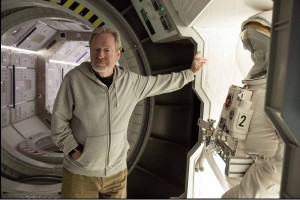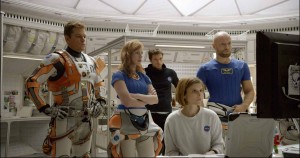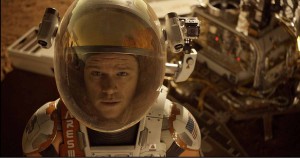
Goddard’s script, based on Andy Weir‘s book, retains a much greater amount of the novel’s hard science fiction leanings than other films might have dared to do. Scott is as keen as anyone to emphasize the importance of screenwriting in general, but particularly so in terms of the need to present technical concepts in an understandable way. “My time is spent with writers when I’m not making a movie. The hardest thing is to get it on paper. I talked to Drew a lot, flicking through things, asking fundamentally about the science of it all.”

Equally important, Scott feels, was an avoidance of what he refers to as “Sentimentality. Sentimentality is unearned emotion.” As such, the film is mercifully free of the sort of set-piece character conflict that can seem manufactured and unrealistic. “I refused to get into ‘oh, I’ve got the wife and kids back [home]’… It’s so redundant. It’s not what it’s about. It’s only relevant when the crew have to make a decision to go back for him and delay their return to Earth by 18 months.” Comparisons to the realistic crew personalities of Alien are inevitable, and not only because Alien is one of Scott’s own films. He also raises a comparison with Black Hawk Down, which similarly avoided any attempt to boilerplate the characters with the baggage of unnecessary backstory. “I don’t want people whining about what’s back home, wife and kids. The engine is about what happens over the next 18 hours.”
 In contrast to his hands-off approach to the script, Scott’s involvement in casting is complete. “Nobody ever casts for me. That’s the job,” he said, with an air of unquestionable finality. In terms of the film’s key lead role, “I’d never worked with Matt, never even met Matt before, but knew the book and he was very keen on it… he wanted to know who the director was before he’d commit.” At the time, Damon had recently appeared in Christopher Nolan‘s Interstellar, raising at least some concerns about similarities between two such large-scale science fiction films. Still, Scott “met with [Damon], because I know Chris [Nolan] I was able to take a look and thought, honestly, it’s not a problem. This film will come out a year and a bit later and honestly who cares. It’s so different.”
In contrast to his hands-off approach to the script, Scott’s involvement in casting is complete. “Nobody ever casts for me. That’s the job,” he said, with an air of unquestionable finality. In terms of the film’s key lead role, “I’d never worked with Matt, never even met Matt before, but knew the book and he was very keen on it… he wanted to know who the director was before he’d commit.” At the time, Damon had recently appeared in Christopher Nolan‘s Interstellar, raising at least some concerns about similarities between two such large-scale science fiction films. Still, Scott “met with [Damon], because I know Chris [Nolan] I was able to take a look and thought, honestly, it’s not a problem. This film will come out a year and a bit later and honestly who cares. It’s so different.”
As a famously visual filmmaker with a record of directing some of the best-looking science fiction in film history, Scott’s interest in the design of The Martian was keen, but nonetheless cautious. “Design is terribly important but so is making sure you don’t over design… if you’re doing Star Trek that’s one thing, Star Wars that’s another. But if you’re doing 2001 you’d better get it right… I was more influenced by 2001 than anything else.”
 Various sources date the narrative to the 2030s and 2040s – and Weir has commented that the depicted orbital dynamics can be used to date it quite specifically – so the depicted technology level predates that of Alien by some distance. As such, Scott relied mainly on extrapolation of current and imminent technology. “It’s not going to be diagonal zips and silver hair,” he said. “On The Martian I’d go and see what Elon Musk is designing… and also what NASA have today. They also sent me what they were speculating about.”
Various sources date the narrative to the 2030s and 2040s – and Weir has commented that the depicted orbital dynamics can be used to date it quite specifically – so the depicted technology level predates that of Alien by some distance. As such, Scott relied mainly on extrapolation of current and imminent technology. “It’s not going to be diagonal zips and silver hair,” he said. “On The Martian I’d go and see what Elon Musk is designing… and also what NASA have today. They also sent me what they were speculating about.”
Despite the clearly fictional basis of The Martian, based on a book that even Weir happily admits relies on the assumption of fundamental advances in spacecraft technology, there’s more than a hint of interest from Scott in the possibility of a Mars shot happening for real. “If they’d proceed with funding now,” he says, “they’d be standing on Mars around 2025. Someone who’s training in astronaut school now would be one of the guys to go up there.”





